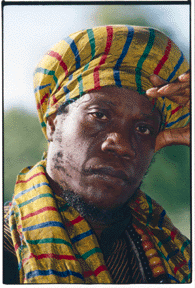
On July 16th, the Malone Community Center will host a unique event for followers
of music, literature, and Jamaican culture. Mutabaruka, one of Jamaica's
leading artists and folk spokespersons, will deliver an hour-long spoken
word and poetry presentation.
Those who follow reggae music may know the artist Mutabaruka as one of the
leading exponents of the genre known as "dub poetry." The form
derived as a natural extension of the Jamaican oral tradition and poetry,
combined with a musical backdrop of the island's well-known reggae rhythms.
To call Mutabaruka merely a "dub poet" belies his accomplishments
in music production, radio, film, and business. He owns an African book
store called "Books About Us" in Kingston, Jamaica and has been
involved in the operation of one of the island's leading music distribution
companies. In 1994, he had a significant film role as Shango in Haile Gerima's
film Sankofa. He also appeared in the Jamaican documentary Land
of Look Behind and the Peter Tosh documentary Red X.
Mutabaruka was known in Jamaica from the early 70s for his independently
published poetry collections, Outcry (1973), Sun and Moon
(1976) and The Book: First Poems (1981) before he gained notoriety
internationally from his acclaimed debut album Check It, released
in 1983. His subsequent recording career has included five studio albums
and an anthology.
Most recently, Mutabaruka released an album of strictly rhythm tracks, Muta
In Dub on Lethal Records (Mercury), and a brilliant production of historic
reggae artists called Gathering of the Spirits on the Shanachie label.
As a producer, he has been responsible for the collections Word Soun'
'ave Power its companion, Dub Poets Dub, and a collection of
female dub poets called Woman Talk.
Mutabaruka's most important contribution to Afro-Jamaican culture may be
his weekly radio program. "The Cutting Edge" airs Tuesday nights
from 10 p.m. to 3 a.m. on Jamaica's all-reggae station, IRIE-FM. Since the
show went on the air in 1993, Muta's role as an opinion leader in Jamaica
has increased exponentially. The program is unofficially estimated to have
a weekly listenership of 200,000 on an island of just over 2.5-million.
While the program is not officially syndicated, Muta jokes that it is, because
tapes of the program circulate the globe thoroughly via networks of enthusiastic
followers.
"The Cutting Edge" features a mixture of commentary, interviews,
tapes of lectures, etc., mixed with music from the African Diaspora -- with
no particular partiality to his closest form of cultural expression, reggae.
"We play music that is hardly played on the radio in Jamaica,"
he says. "We have this world beat outlook. Reggae music to me is just
a good music. [I] don't see myself as a reggae artist. [I] use anything
that is necessary [to] fulfill . . . black consciousness, black liberation."
As a Rastafarian or follower of Ethiopian Emperor Haile Selassie (Ras Tafari),
Muta is a part of an international spiritual and political movement born
in Jamaica and spread internationally by the works of Bob Marley in the
1970s. But within his Rastafarian community, Mutabaruka has been outspoken,
controversial and challenging on certain aspects of the faith, including
the role of women and the ritual smoking of marijuana. Mutabaruka's firm
commitment to the goals of Pan-Africanism is a unifying factor.
Muta feels a physical repatriation to Africa is requisite to fulfill his
life's mission. "That is why Rastafari to me is so important and relevant.
Is for years Rasta been saying this: 'We want [to] go [to] Africa.' And
even Utopian as it may sound, is we have to go to Africa to make Africa
the Mount Zion that we talk about in we mind. The heaven that we speak of
. . . is Africa."
Muta's political leanings are to the extreme left, and his commentaries
on institutional Christianity are usually scathing and offensive to some.
At the same time, his demeanor can be very jovial. His sense of humor runs
deep and is often at the forefront of his commentary.
Admission to Mutabaruka's 7:30 p.m. performance at the Malone Community
Center (2032 U Street, Lincoln) is free to the public. The event is made
possible by a grant from the Nebraska Arts Council's multicultural assistance
program.
For more information, cvanpelt@inetnebr.com.
Links of interest
Muta web site: www.ireggae.com/muta.htm
Muta Interviews
